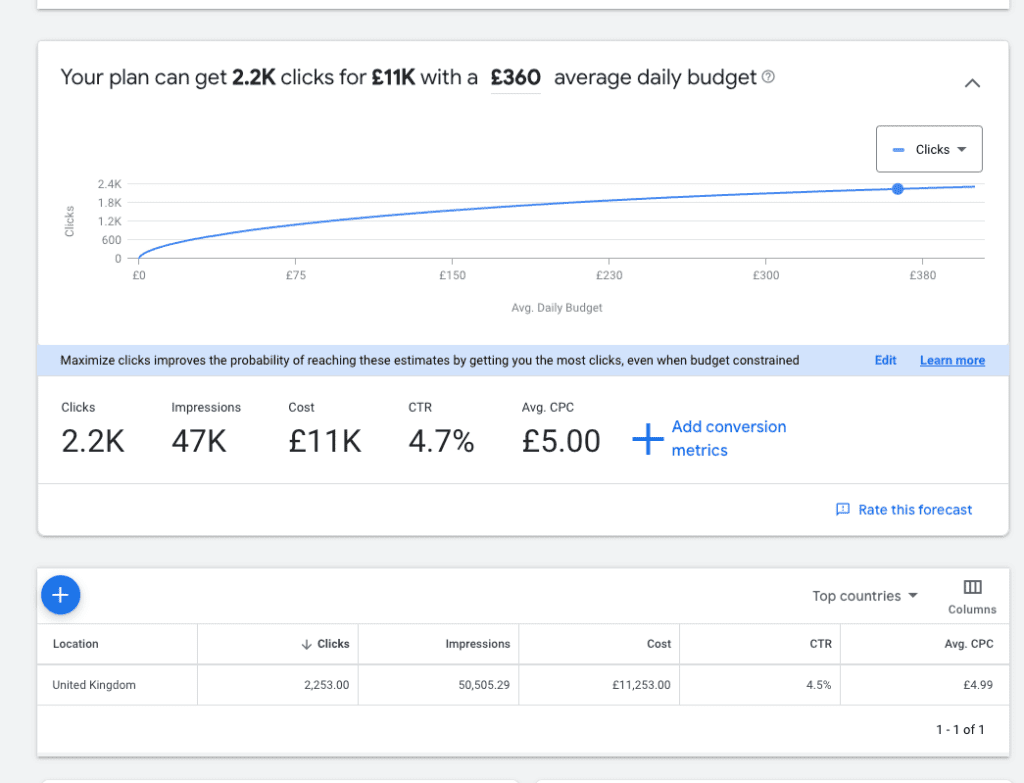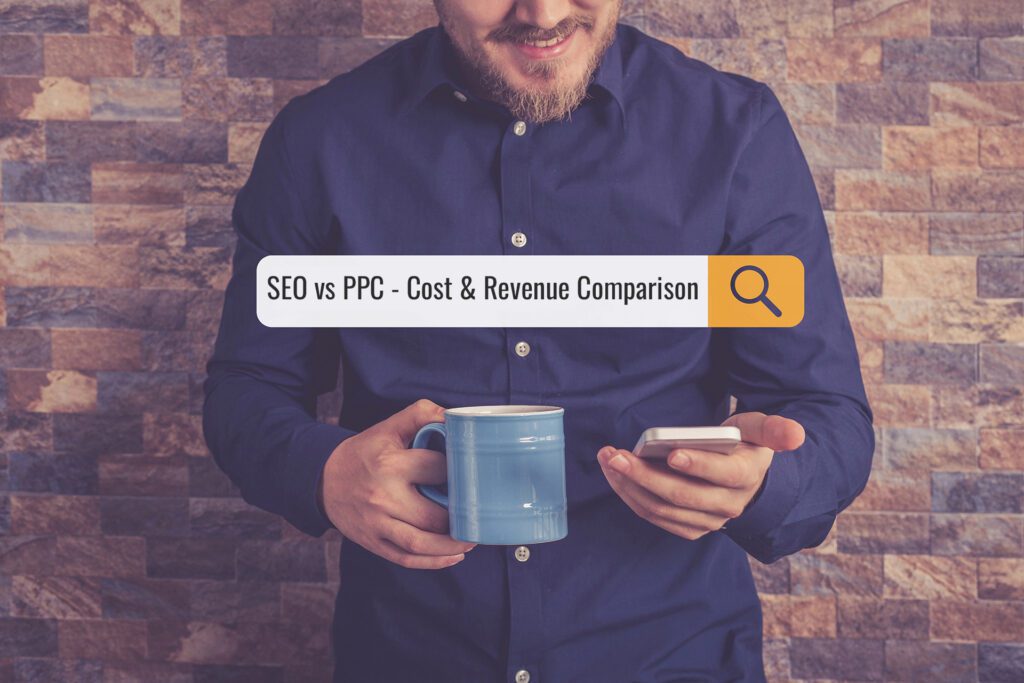Though both are critical, the cost and profit margins differ significantly. PPC costs more upfront and offers quick returns, while SEO takes time but provides sustainable results.
Did you know? Businesses spend an average of $9,000 per month on PPC campaigns【source】.
Imagine your business as a garden: PPC is like buying ready-made flowers, while SEO is planting seeds for a future bloom. PPC gives you instant results but can be expensive. In contrast, SEO is more cost-effective and fosters organic growth over time.
Pro Tip: Use PPC for immediate traffic, but invest in SEO for long-term profitability. Keep reading to discover a real-life comparison highlighting key cost and profit differences.
PPC vs SEO – Real-Life Comparison
We want to show a real-life comparison of SEO vs. PPC, so we decided to do the maths and see what results we could get with both marketing channels.
We also need to make some disclaimers, as your results may vary. We don’t account for market fluctuations and major market shifts. We also don’t account for holiday seasons, Christmas and New Year Eve, the January slump, and all that. So, for test purposes, we assume that the demand for the product we have is steady and there are no major seasonal changes and market ups and downs.
Also, we’ve taken an industry standard-ish conversion ratio of 30% for all clicks we accumulate via PPC and SEO, and we have a steady average conversion value of £50 for this test purpose.
Obviously, these are ideal scenarios, and your mileage may vary, but we think the numbers are still valid for test purposes. We also assume that we managed to keep the #1 SEO ranking for the keyword for over a year, which is doable with the right skills and budget.
Assumptions:
- Keyword Volume: ~50,000
- PPC Clicks: 2800 clicks per month with a £11,000 monthly budget.
- SEO Clicks: 2500 clicks per month with varying budget (to be explained further down)
- Conversion Rate: 30%
- Value per Conversion: £50 (assumed for the test purposes, not based on any data)
Chosen Keyword
We decided to choose “quick loans” as our intended keyword of choice. We know from experience that it is a high-value keyword and Google KW Planner recommends a daily budget of £360 and a max total spend of £11,000 per month while promising a bit over 2000 clicks per month:

Let’s assume that we can do a bit better, and we can bring 2800 clicks per month with a budget of £11000 pounds.
On the SEO front, we should, on paper, according to several sources, get around 25-27% of all the impressions for the keyword, 25% of over 50000 impressions should be well over 10000 clicks a month, but we know from experience in finance SEO, that we can’t really get over 3000 clicks a month for “quick loans” as a keyword, at least not realistically. Let’s assume that we can, however, get 2800 clicks, similar to PPC.
PPC Campaign Analysis
The PPC campaign is easy. As long as you continue with the ad spend, you will be nearly guaranteed to get traffic and conversions. The numbers are simple – you spend more money and get more traffic and conversions until you hit the plateau of the max searches per keyword.
PPC Costs:
- Monthly Budget: £11,000
- Annual Budget: £11,000 * 12 = £132,000
- Total Cost Over 2 Years: £132,000 * 2 = £264,000
Clicks:
- Monthly Clicks: 2,800
- Annual Clicks: 2,800 * 12 = 33,600
- Total Clicks Over 2 Years: 33,600 * 2 = 67,200
Conversions:
- Conversion Rate: 30%
- Monthly Conversions: 2,800 * 0.30 = 840
- Annual Conversions: 840 * 12 = 10,080
- Total Conversions Over 2 Years: 10,080 * 2 = 20,160
Revenue:
- Value per Conversion: £50
- Monthly Revenue: 840 * £50 = £42,000
- Annual Revenue: £42,000 * 12 = £504,000
- Total Revenue Over 2 Years: £504,000 * 2 = £1,008,000
SEO Campaign Analysis
Boost Your Online Visibility With Kaleto.Digital

This is where it gets tricky. Before we dive into the maths, let’s assume a few bits. With enough budget and skill, let’s assume that we managed to bring that keyword to position one and keep it there for over a year. Yes, it is possible and doable, even with a limited budget.
Let’s assume that we start from positions 5 to 6 with limited traffic and conversions. Over the course of six months, we reach position one and keep it steady for the next 18 months.
Yes, it is a bit ambitious and potentially dangerous claim, but let’s assume that it is possible with a good SEO provider (it is!) and let’s see what the SEO results, revenue and spending would be if we ran a £5000 SEO campaign for six months till we reached the desired result. Then we entered a maintenance phase of only spending about £2000 a month on link building and supporting content, etc…
Estimated SEO clicks over the 6-month period
| Month | SEO Position | Clicks |
|---|---|---|
| 1 | 6 | 250 |
| 2 | 5 | 300 |
| 3 | 4 | 700 |
| 4 | 3 | 1,000 |
| 5 | 2 | 2,000 |
| 6 | 1 | 2,800 |
Now, keep in mind that this is an ideal scenario. Let’s assume the business had already done some SEO work and got to position 6, but it had underlying issues and lacked proper SEO authority.
A real-life scenario could mean that we do the work and see nothing for the first 4 months, then jump to position 2 and then position 1 two months later. But for the sake of this test, let’s assume that we can move from position 6 to position 1 within six months in an ideal scenario. Let’s look at the SEO costs:
SEO Costs:
- Initial 6 Months: £5,000 per month for 6 months
- Total Initial Cost: £5,000 * 6 = £30,000
- Maintenance Phase: £2,000 per month for the next 18 months
- Total Maintenance Cost: £2,000 * 18 = £36,000
- Total Cost Over 2 Years: £30,000 + £36,000 = £66,000
Clicks:
- Initial 6 Months: 7,050 clicks
- Maintenance Phase: 2,800 clicks per month for 18 months
- Total Maintenance Clicks: 2,800 * 18 = 50,400 clicks
- Total Clicks Over 2 Years: 7,050 + 50,400 = 57,450 clicks
Conversions:
- Conversion Rate: 30%
- Initial 6 Months Conversions: 7,050 * 0.30 = 2,115
- Maintenance Phase Conversions: 50,400 * 0.30 = 15,120
- Total Conversions Over 2 Years: 2,115 + 15,120 = 17,235
Revenue:
- Value per Conversion: £50
- Initial 6 Months Revenue: 2,115 * £50 = £105,750
- Maintenance Phase Revenue: 15,120 * £50 = £756,000
- Total Revenue Over 2 Years: £105,750 + £756,000 = £861,750
SEO vs PPC Spend and Revenue Comparison
| Metric | PPC Campaign | SEO Campaign |
|---|---|---|
| Total Cost | £264,000 | £66,000 |
| Total Clicks | 67,200 | 57,450 |
| Total Conversions | 20,160 | 17,235 |
| Total Revenue | £1,008,000 | £861,750 |
| Net Profit | £744,000 | £795,750 |
| Cost per Click | £3.93 | £1.15 |
The PPC campaign generates around 17% more clicks than the SEO campaign. However, this difference in click volume comes at a much higher cost, indicating that while PPC can deliver more traffic, it does so at a greater financial expense.
Let’s stop SEO and PPC after one year.
Let’s see the unusual scenario of what would happen if we stop any spending going to PPC or SEO after one year:
Comparison Summary After Stopping Spend and Gradual Drop:
| Metric | PPC Campaign- Year 1 | SEO Campaign – Year 1 |
|---|---|---|
| Total Cost | £132,000 | £42,000 |
| Total Clicks | 33,600 | 42,250 |
| Total Conversions | 10,080 | 12,675 |
| Total Revenue | £504,000 | £633,750 |
| Net Profit | £372,000 | £591,750 |
| Cost per Click | £3.93 | £0.99 |
If we stop PPC spending, we know there will be nearly zero traffic to the site from paid activities. We don’t factor in brand awareness and all that for test purposes.
The SEO, again, is far more complicated. For simplicity, let’s assume momentum will go for 3-4 months of inertia rankings, then a gradual drop back to position 6, where we initially started. The clicks distributions MoM should look something like this for test purposes:
Comparison Table for Year 2 (Stopping Spend After Year 1)
| Month | Clicks |
|---|---|
| Month 1 | 2,800 |
| Month 2 | 2,800 |
| Month 3 | 2,800 |
| Month 4 | 2,800 |
| Month 5 | 2,000 |
| Month 6 | 1,500 |
| Month 7 | 1,000 |
| Month 8 | 700 |
| Month 9 | 500 |
| Month 10 | 500 |
| Month 11 | 500 |
| Month 12 | 500 |
Let’s run the numbers for SEO vs PPC for year 2 given these assumptions:
SEO vs PPC – Year 2, No Spend
| Metric | PPC Campaign (Year 2, No Spend) | SEO Campaign (Year 2, No Spend, Gradual Decline) |
|---|---|---|
| Total Cost | £0 | £0 |
| Total Clicks | 0 | 18,400 |
| Total Conversions | 0 | 5,520 |
| Total Revenue | £0 | £276,000 |
| Net Profit | £0 | £276,000 |
| Cost per Click | – | £0.00 |
This table clearly and directly compares the PPC and SEO campaign metrics for the second year after stopping the spending.
What do we see here?
The SEO campaign provides traffic, conversions, and revenue even after spending stops. This showcases the strength of SEO in delivering lasting benefits, as the website maintains a presence in search results due to prior optimisations and link-building efforts.
The PPC campaign is highly dependent on ongoing expenditure. Without a continuous budget, it ceases to generate any traffic, conversions, or revenue, underscoring its role as a short-term, immediate-impact strategy.
For businesses looking for sustainable growth and ongoing returns, SEO presents a compelling case. SEO’s long-term benefits, including lower costs and continued performance, make it a more advantageous investment than PPC’s immediate but short-lived impact. This analysis suggests that while PPC can be useful for quick results, SEO provides a durable foundation for sustained online success.
Keep in mind that we are in no way discounting PPC. PPC is an indispensable marketing channel for quick growth, especially for startups and businesses that need sales now, not in six months. SEO cannot replicate the instant gratification of PPC, regardless of the overpromising of SEO salespeople. SEO takes time and a significant investment, but it is evident that it pays for itself in no time. A single position 1 standing can pay for a year of SEO efforts in a single month if all is done well.

